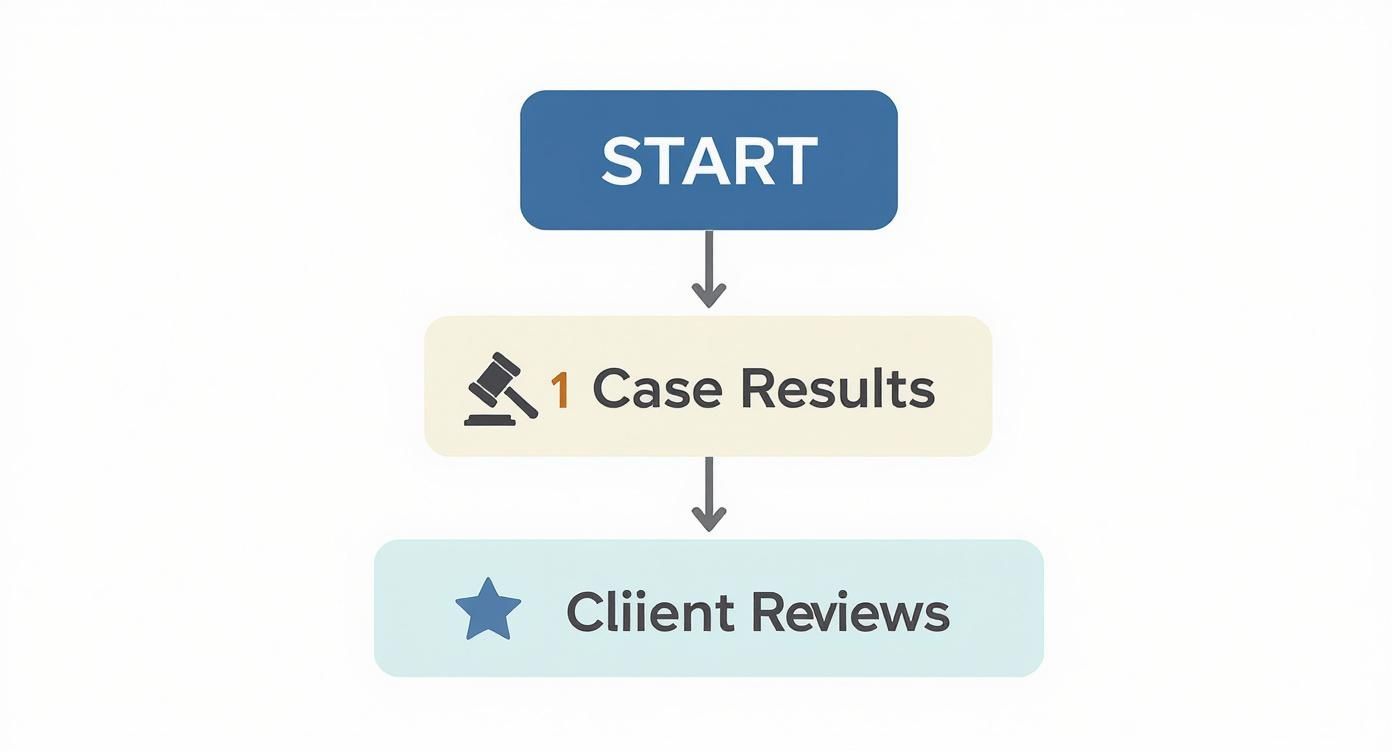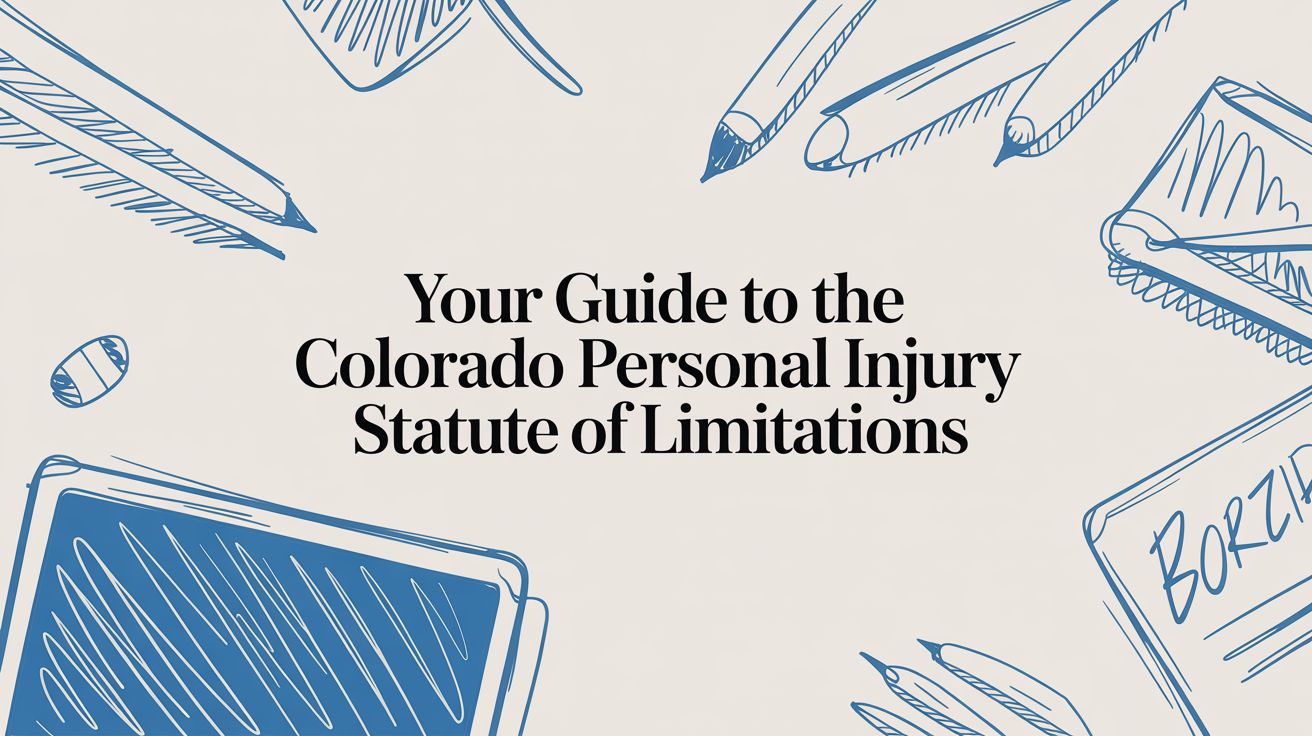Table of Contents
For law firm owners, guiding a potential client through the process of choosing the right personal injury attorney is a critical, trust-building exercise. When a person is injured, their decision is fraught with stress and uncertainty. Your firm’s content and initial consultations must cut through the noise with clarity and authority. The goal is to educate them on what truly matters: a history of relevant results, a transparent fee structure, and a proven system for client communication.
Get these three elements right in your firm’s messaging, and you're not just selling legal services—you're positioning your practice as a trusted partner capable of protecting a client's future and delivering peace of mind.
The Challenge: Navigating the Post-Injury Chaos

The period immediately following an accident is a whirlwind for your potential clients. They are juggling doctor's appointments, fielding calls from insurance adjusters, and trying to manage daily life while in pain. The last thing they want is a confusing, high-pressure search for a lawyer.
This is where many firms fail. They focus on aggressive marketing instead of structured guidance. However, a client's choice of attorney sets the entire trajectory of their case. A great attorney isn't just a legal representative; they are a strategist, a guide through a complex legal maze, and the advocate who will secure the compensation the client deserves. Your firm must demonstrate it can be that guide from the very first interaction.
The Modern Legal Landscape
The legal field has become hyper-specialized. A client wouldn't ask a podiatrist to perform open-heart surgery, and the same logic applies to law. An attorney focused on real estate closings lacks the niche expertise to navigate the complexities of a serious injury claim.
The personal injury market is a massive, competitive space—worth approximately $61.3 billion in 2024, with around 135,000 personal injury lawyers competing for cases. This creates significant noise. Your firm must prove it is a specialist that understands the insurance companies' playbook inside and out. You can learn more about the legal market from industry reports by IBISWorld.
Why a Client's Choice Matters
Making an informed choice saves a client immense frustration. When they select the right attorney from the start, their case is built on a solid foundation.
Here’s what a specialist firm brings to the table:
- Deep Local Knowledge: Your team lives and breathes Colorado's personal injury laws, from statutes of limitations to nuanced rules on fault and liability.
- Negotiating Clout: Your attorneys have gone head-to-head with insurance adjusters countless times. They recognize the tactics and are not intimidated by lowball offers.
- An Objective Voice: When a client is hurt and stressed, clear thinking is difficult. A good lawyer provides a calm, professional perspective to help them make strategic, not emotional, decisions.
A great personal injury attorney doesn't just react to the insurance company's moves—they anticipate them. Their experience allows them to build a proactive case strategy designed to counter lowball offers and delay tactics, putting you in a position of strength from the start.
Before a client even begins consultations, they need a mental checklist. This table breaks down the three core pillars your firm should emphasize.
Quick Checklist: The Three Pillars of a Great PI Attorney
| Pillar | Why It Matters | Quick Verification Tip |
|---|---|---|
| Proven Experience | You need someone who has handled cases similar to yours—and won. General practice lawyers don't have the niche knowledge to fight insurance giants effectively. | Look for specific case results or testimonials on their website related to your injury type (e.g., car accidents, slip and falls). |
| Transparent Fees | Hidden costs or confusing fee structures can create massive stress later. You need to know exactly how and when the attorney gets paid, with no surprises. | Ask for a copy of their contingency fee agreement before you sign. A reputable attorney will gladly provide it. |
| Clear Communication | Being left in the dark is one of the biggest complaints clients have. Your attorney's office should have a clear process for keeping you updated on your case. | During the consultation, ask: "Who is my main point of contact, and how often can I expect updates?" Their answer reveals a lot. |
Educating clients on these three pillars helps them filter out settlement mills and find a genuine advocate ready to fight for their best interests.
The Solution: A Systematized Approach to Vetting Attorneys
When a client is trying to figure out how to choose a personal injury attorney, they shouldn't be swayed by a simple "years in practice" metric. A law firm that has spent a decade settling fender-benders for quick, low-value offers is fundamentally different from one that has spent ten years taking complex cases to trial and winning.
Your firm's process should help clients cut through marketing fluff to find hard proof of capability. They need to know if they're talking to a lawyer who processes claims or one who is prepared to fight for the true value of their case—even if that means going to court.
Look Past the Polished Homepage
Every law firm website is a sales pitch. It is your responsibility to provide objective proof of your firm's competence. While testimonials are valuable, they are curated.
The real evidence lies on a "Case Results" or "Verdicts and Settlements" page. A firm proud of its work will showcase it by detailing the case type, injury, and final recovery amount. Clients look for cases that mirror their own. If they were injured in a serious truck crash, they need to see a history of wins in those specific, complex claims.
This isn't just a hunch; it's what clients demand. A 2023 survey found that nearly 40% of people cited a lawyer's experience and track record as the most important factors in their decision. But "experience" means relevant experience. You can see what else clients are looking for in the full survey results on Attorney at Work.
Don't fall for the lawyer who promises a fast, easy payout. The best attorneys prepare every single case as if it's going to trial. That preparation is what forces insurance companies to the table with a serious offer. A credible threat of litigation is the most powerful tool in your corner.
Action Steps: A Framework for Client Evaluation
After online research, the initial consultation is the most critical step. This meeting is more than a Q&A; it's an interview where the client assesses a potential partner. They must get past the slick website and five-star reviews to understand how an attorney really operates. Help them find out by structuring your consultations to answer their unasked questions.
Here are four critical areas to address proactively in every consultation:
- Demonstrate Direct Experience: Don't wait to be asked. Start by discussing past cases similar to the client's. Explain the challenges, the strategies you employed, and the outcomes. This immediately establishes relevance and authority.
- Outline the Case Plan: Provide a clear, step-by-step overview of how you would approach their case. Explain who their primary point of contact will be—a senior partner, a junior lawyer, or a paralegal. This transparency manages expectations from day one.
- Define the Communication Process: Vague promises like "we'll keep in touch" are a major red flag for clients. Present your firm's communication system. Is it scheduled monthly calls? A secure client portal for 24/7 updates? A dedicated case manager? A clear process demonstrates operational maturity.
- Provide a Crystal-Clear Fee Breakdown: Walk every potential client through your contingency fee agreement line by line. Explain the difference between fees and costs and clarify whether costs are deducted before or after your percentage is calculated. This builds immense trust. An honest, upfront assessment of potential roadblocks shows you’re thinking critically, not just selling a dream.
This decision tree gives you a simple framework for weighing what you learn.

As you can see, it’s not just about winning cases. It's about how they get there and how they treat clients along the way. Both are equally important.
Real Example: Conduit Legal's Automation-Driven Transparency
At Conduit Legal, we leveraged automation to solve the number one client complaint: lack of communication. Instead of relying on manual check-ins, we built an automated workflow. Our system sends clients a brief, personalized update via email or text every 14 days, regardless of case activity. This simple automation ensures no client ever feels forgotten, reinforces our firm’s reliability, and frees up our paralegals from playing phone tag to focus on high-value legal work. The result is a smoother workflow, happier clients, and a stronger reputation.
Spotting these signals early can save you from a world of frustration down the road.
If you're ready to see how a professional, client-focused firm handles these crucial first conversations, we're here to help. You can schedule a free consultation with our team to understand your legal options and get the clear answers you deserve.
Understanding Contingency Fees and Firm Resources
Let's talk about money. It’s often the most awkward part of hiring an attorney, but it shouldn't be. When you’re dealing with a personal injury, the last thing you need is a mountain of legal bills. That’s where the contingency fee model comes in, and it’s the standard for a reason.
Put simply, you don’t pay your lawyer a dime upfront. Their fee is “contingent” on them winning your case. If you get a settlement or a jury verdict, their payment is a pre-agreed percentage of that recovery. If they don’t win? You owe them zero in attorney fees.
This setup levels the playing field. It gives you access to top-tier legal help without having to worry about your bank account. But—and this is a big but—not all contingency agreements are created equal. The standard fee usually hovers between 33% and 40%, but you need to know exactly how and when that percentage is calculated.
Uncovering the Hidden Costs of a Case
Here’s a detail that trips up a lot of people: attorney fees and case costs are two totally different things. How a law firm handles this distinction can make a huge difference in how much money actually ends up in your pocket.
Case costs are all the out-of-pocket expenses needed to properly fight your case. A good firm will front these costs for you, so you’re never paying for them as you go.
We’re talking about things like:
- Expert Witness Fees: Hiring a doctor to explain your injuries or an accident reconstructionist to prove fault. These experts can be expensive but are often critical.
- Court Filing Fees: The administrative costs just to get your lawsuit filed.
- Deposition Costs: Paying for the court reporter and transcripts when we question the at-fault driver or other key witnesses under oath.
- Evidence Gathering: The costs for pulling medical records, police reports, and other vital documents.
You have to ask this one critical question: Are case costs taken out of the total settlement before or after the lawyer’s percentage is calculated? It sounds like a minor detail, but it can literally change your net recovery by thousands of dollars. A transparent lawyer won't just tell you—they'll show you in the agreement and explain it line by line.
Why a Firm’s Financial Resources Matter
Make no mistake, taking on a major insurance company is an expensive fight. They have near-bottomless pockets and a team of lawyers whose entire job is to minimize what they pay you. They will drag things out, hire their own biased experts, and do whatever it takes to wear you down.
This is exactly why your law firm’s financial stability is so important. A well-funded firm has the war chest to match them, blow for blow. They can afford to hire the best experts for your case, not just the cheapest ones. They can fund a thorough investigation and, if necessary, take your case all the way to a jury trial without ever blinking.
A firm that's financially stretched might feel pressure to push you into a lowball settlement just to cover their own costs. You need a firm that can afford to wait for the right offer, not just the first one.
When you're interviewing a lawyer, you're also interviewing their firm's ability to fund your fight to the finish line. For a deeper dive into how it all breaks down, check out our complete guide to understanding accident lawyer fees.
Why Communication and Technology Matter

Legal skill is the price of admission, but a lawyer’s communication style is what will make or break your experience. Trust me, nothing is more frustrating than being left in the dark about your own case. It’s one of the biggest complaints clients have, and a great law firm knows this. They build their entire practice around keeping you in the loop.
Weeks of silence after you leave a message? Vague email replies? These aren't just annoying—they’re massive red flags. It often means the firm is disorganized, overwhelmed, and can't handle its caseload. You want proactive communication, not radio silence. You should feel like a priority, not just another case file on a messy desk.
Look for a Tech-Forward Firm
These days, the best firms have moved way beyond dusty file cabinets and endless phone tag. They use technology to make the whole process more efficient, transparent, and less stressful for you. This isn't about having flashy gadgets; it’s about using smart tools that actually help your case and keep you connected.
A firm that invests in technology can offer real advantages, like:
- Secure Client Portals: This is a game-changer. It gives you 24/7 access to your case documents, lets you check important dates, and even message your legal team directly.
- Automated Case Updates: Imagine getting a quick text or email when a key milestone is reached. You're never left wondering what's going on.
- Digital Document Management: This streamlines how your team collects and organizes everything—police reports, medical records, you name it.
This kind of efficiency isn't just for show. It translates directly into a stronger case. When lawyers and paralegals aren't drowning in administrative chaos, they have more time to focus on what really matters: crafting a winning strategy and fighting for the compensation you deserve.
A law firm's investment in technology is a direct investment in its clients. It shows they care not just about winning, but about making the entire journey as painless as possible for you.
Asking the Right Questions About Their Tech
Don’t be shy about this during your consultation. Dig into the specific tools and systems they use. Their answers will tell you a lot about how much they value your peace of mind.
The legal world is slowly but surely catching on to new tech. A recent personal injury statistics report revealed that 37% of personal injury professionals are now using generative AI to help with things like drafting letters and summarizing dense medical records. This helps them move faster and communicate more clearly.
So, how can you tell if a firm is ahead of the curve or stuck in the past? Ask direct questions.
- "How will you keep me updated on my case's progress?"
- "Do you have a client portal where I can see documents and send messages?"
- "What kind of technology do you use to manage all the evidence and communication for a case like mine?"
A modern, forward-thinking attorney will be excited to tell you about their systems. A hesitant or dismissive answer tells you everything you need to know. You want a partner who is built for today's world, not one clinging to yesterday's methods.
Conclusion: Making the Final Decision
You’ve guided the client through the research, the calls, and the consultations. Now, they must choose. This is the moment to empower them to shift from gathering facts to making a confident, gut-level choice. Reinforce that this isn't just about who has the best website or the most impressive degree; it's about choosing an advocate who will guide them through a difficult time.
Creating a Simple Scorecard
To make an objective choice, advise them to use a simple scorecard. This tool prevents them from focusing on a single factor and forces a balanced evaluation against key criteria.
Have them rate each top contender on a scale of 1 to 5 for these key areas:
- Relevant Experience: How well does their track record align with your specific type of case?
- Communication Style: Did they talk to you like a real person? Did you feel heard and understood?
- Fee Structure Clarity: Was the contingency fee explained clearly, with no confusing jargon?
- Firm Resources: Do they have the muscle—the team and the financial backing—to go the distance for you?
- Your Personal Comfort Level: This is the big one. Do you actually trust this person to have your back?
Trust your gut. A law degree doesn't guarantee a good partnership. If you felt rushed, dismissed, or just got a weird vibe from an attorney during the consultation, that feeling won’t magically disappear once the retainer is signed. The entire attorney-client relationship hinges on trust, and that starts from day one.
Once a client has made their decision, they can move forward with confidence. A final check can be helpful here; for example, you can see a direct comparison of Conduit Law vs. other Denver personal injury lawyers to see how different firms really stack up in practice. Helping a client understand how to choose a personal injury attorney is the first step in building a successful and trust-based relationship.
Start your free 20-minute automation audit and discover how to save hours every week without adding staff.
Written by
Conduit Law
Personal injury attorney at Conduit Law, dedicated to helping Colorado accident victims get the compensation they deserve.
Learn more about our team



